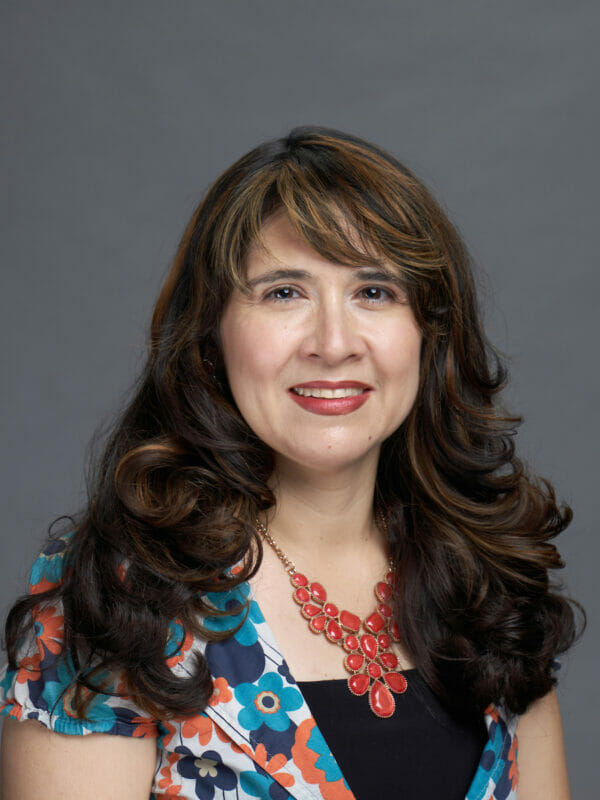
Rosana Bravo, PhD, MPH
Assistant Professor, Department of Health Sciences Education Health Professionals Education Track Coordinator
College of Health Sciences
2016 PhD, Public Health, University of California, Los Angeles
Concentration: Community Health Sciences
Minor: Education
Dissertation: Medical Decision-Making Among Foreign-Born Latino Elders with Multimorbidities
2004 MPH, Community Health Sciences, California State University, Northridge
Concentration: Health Education
Graduated with Distinction
2001 BS, Biology, California State University, Los Angeles
Minor: French
Graduated with Departmental Honors in Biology
Prior to joining WesternU, Dr. Bravo worked as a researcher at the UCLA Center for Health Policy Research and the UCLA Jonsson Comprehensive Cancer Center where she led multiple community-based intervention projects.Most recently, she oversaw the evaluation for the Healthy Aging Partnerships in Prevention Initiative (HAPPI), a multi-component research project aimed to increase the use of clinical preventive services (e.g., cancer screenings and immunizations) in South Los Angeles among Latino and African American elders.
Summer 2019- Present
School: Western University of Health Sciences
Department: Physical Therapy Education
Courses: Research Methods II (PA 5206); Research Methodology in Health Care (PT 5130); Capstone Project I (PT 8400);
Summer 2019- Present
School: Western University of Health Sciences
Department: Health Sciences Education
Courses: Grant Writing (HSCI 5020); Research and Program Evaluation Methods (HSCI 5206);
Competencies for Community Health Educators (HSCI 5018);
Spring 2018; Adjunct Faculty
School: California State University, Los Angeles
Department: Public Health
Course: Vulnerable Populations in the US Healthcare (PH 4220)
Fall 2017; Adjunct Faculty
School: California State University, Long Beach
Department: Health Science
Course: Biostatistics (HSC 403)
Fall 2003 – Spring 2004; Teaching Associate
School: California State University, Northridge
Department: Community Health Sciences
Course: Biostatistics (HSCI 390)
Her research interests are in minority health, health care experience, decision-making, and end-of-life care in communities of color, particularly the impact of ethnicity on hospice use.
October 2018 – Present; Researcher
Western University of Health Sciences (Clinical Teaching)
September 2009 – June 2018; Researcher / Evaluator
UCLA Center for Health Policy and Research (Minorities and Aging)
January 2010 – August 2012; Project Director / Research Coordinator
Veteran Administration Greater Los Angeles Healthcare System (Minorities and Palliative Care)
September 2005 – September 2009; Project Coordinator, Research Associate and Executive Assistant
UCLA Jonsson Comprehensive Cancer Center (Minorities and Cancer)
Division of Cancer Prevention and Control Research
Minority Training Program in Cancer Control Research Doctoral Application Support Award
PEER-REVIEWED PUBLICATIONS
Bravo, RL, Gutierrez, A., Silvia Ramirez, Young, MDT, Wallace, SP (2019). The Promotora Experience: The
relationship between Promotoras, the Community and the Institutions. Inpreparation.
Bravo, RL., Kietzman, KG, Toy, P, Duru, OK, Wallace, SP. (2019). Linking Primary Care and Community
Organizations to Increase Colorectal Cancer Screening Rates: The HAPPI Project. Salud Pública de
México, 4(61): 427- 435.
Kietzman, KG, Toy, P, Bravo, RL., Duru, OK, Wallace, SP. (2019). Multi-sectoral Collaborations to Increase
Use of Clinical Preventive Services by Older Adults. The Gerontologist, 59(Supp1): S57-S66.
Bravo, RL., Gutierrez, A, Young, MDT (2017). Two Steps Forward, One Step Back: Dancing Toward
Equitable Collaboration. Narrative Inquiry in Bioethics, 7(1): 4-7. DOI:10.1353/nib.2017.0002
Ahluwalia, S, Leos, R, Goebel, JR, Asch, SM, Lorenz, KA (2013). Provider Approaches to Palliative Dyspnea
Assessment: Implications for Informatics-Based Clinical Tools. American Journal of Hospice and
Palliative Care, 30(3): 231-238.
Ahluwalia, S, Leos, R., Lorenz, K, Goebel, J. (2011). A User-Centered Design Approach to the Development
of an EMR-Based Symptom Assessment Tool (315-A), Journal of Pain and Symptom Management, 41
(1): 195-196.
NON-REFEREED PUBLICATIONS
Leos, R., Kietzman, KG, Wallace, SP. (2012) “Opportunity Knocks for Community Health Centers: Increasing
the Use of Clinical Preventive Services by Older Adults.” Los Angeles, CA: UCLA Center for Health
Policy Research. Available at http://healthpolicy.ucla.edu
Kietzman, KG., Wallace, SP, Leos, R., Sadegh-Nobari, T., Parks, AV., Satter, DE. (2012) “Opportunity
Knocks for Preventive Health.” Los Angeles, CA: UCLA Center for Health Policy Research. Available at http://healthpolicy.ucla.edu
Wallace, SP, Pourat, N., Durazo, E., Leos, R. (2010) “Older Californians at Risk for Avoidable Falls.” Los
Angeles, CA: UCLA Center for Health Policy Research. Available at http://healthpolicy.ucla.edu
Wallace, SP, Villa, VM., Smith, L., Satter, DE., Pourat, N., Padilla-Frausto, I., Leos, R., Durazo, E.,
Benjamin, AE. (October 2009) “Community-Based Long-Term Care: Potential Consequences of California’s 2009 Budget Cuts.”
Dr. Bravo is amixed-methods social scientist who has worked on multiple health disparities projects in communities of color: aging-related (e.g., multimorbidities, clinical preventive services), cancer, and palliative care. Her current research explains how Latino culture, which has a large faith component influence complex medical decision-making. She has investigated the interplay between modes of communication, explanatory models of illness, faith to explain how they influence decision-making among foreign-born Latinos elders with multimorbidities.

